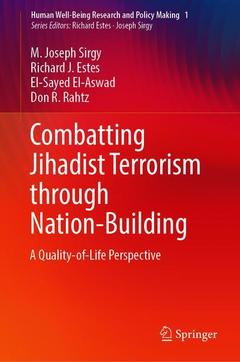Description
Combatting Jihadist Terrorism through Nation-Building, 1st ed. 2019
A Quality-of-Life Perspective
Human Well-Being Research and Policy Making Series
Authors: Sirgy M. Joseph, Estes Richard J., El-Aswad El-Sayed, Rahtz Don R.
Language: English
Subjects for Combatting Jihadist Terrorism through Nation-Building:
Keywords
Islam vs Christianity and Judaism; Jihadist Terrorism and Quality of Life; Economic Ill-Being Factors and Terrorism; Religious Ill-Being Factors and Terrorism; Globalization and Media Ill-Being Factors and Terrorism; Cultural Ill-Being Factors and Terrorism; History of Islam; State of Islamic Social Progress; Drivers of Islamic-Driven Terrorism; Western Response to Islamic Terrorism; Political Drivers of Jihadist Terrorism; Counterterrorism Strategies
Approximative price 79.11 €
In Print (Delivery period: 15 days).
Add to cart173 p. · 15.5x23.5 cm · Hardback
Description
/li>Contents
/li>Biography
/li>Comment
/li>
Part 1: Introduction.- Chapter 1. The Framework.- Part 2: History of Antagonism Between Islam and Judeo-Christianity.- Chapter 2. Islam vs Christianity and Judaism: Historical Perspective from 632-1946.- Chapter 3. Post Colonial Islam and the State of Islamic Social Progress Following the Establishment of the State of Israel in 1947.- Part 3: Drivers of Islamic-Driven Terrorism.- Chapter 4. Economic Drivers.- Chapter 5. Cultural Drivers and Increasing Religiosity.- Chapter 6. Political Drivers, Globalization, and the Media.- Part 4: Western Response to Islamic Terrorism.- Chapter 7. Current Response: Counterterrorism Strategies Focusing on the Supply Side of the Terrorism Market.- Chapter 8. Proposed Response: Counterterrorism Strategies Focusing on the Demand Side of the Terrorism Market.- Appendix A. Major Acts of Islamic Terrorist in the West since 2000.- Appendix B. Supplemental Readings.
M. Joseph Sirgy is a management psychologist (Ph.D., U. Massachusetts, 1979) and Virginia Tech Real Estate Professor at Virginia Polytechnic Institute and State University (Virginia Tech). He has published extensively in the area of well-being and quality of life (QOL). He is the author/editor of many books related to quality of life. He co-founded the International Society for Quality-of-Life Studies (ISQOLS) in 1995, served as its Executive Director/Treasurer from 1995 to 2011 and as Development Director (2011-17). In 1998, he received the Distinguished Fellow Award from ISQOLS. In 2003, ISQOLS honored him as the Distinguished QOL Researcher for research excellence and a record of lifetime achievement in QOL research. In 2010, ISQOLS honored him for excellence and lifetime service to the society. In 2012 he was awarded the EuroMed Management Research Award for outstanding achievements and groundbreaking contributions to well-being and quality-of-life research.
Richard J. Estes, Professor of Social Work and Social Policy, University of Pennsylvania School of Social Policy & Practice, Philadelphia, A.B., La Salle University (Philadelphia); Master of Social Work, University of Pennsylvania; Doctor of Social Welfare, University of California at Berkeley; and post-master’s Certificate in Psychiatric Social Work, the Menninger Foundation, Topeka, Kansas. Dr. Estes specializes in international and comparative social welfare, social policy, and social development. His books include The Social Progress of Nations, 1984; Trends in World Social Development, 1988; Health Care and the Social Services,1984; Towards a Social Development Strategy for the Asia and Pacific Region (with Edward Van Roy), 1992; Social Development in Hong Kong: The Unfinished Agenda, 2005; The Medical, Legal and Social Science Aspects of Child Sexual Exploitation (with Sharon Cooper and others), 2005, 2007;&
Provides an overview of the historical, geo-political, economic, religious, cultural and media drivers of Jihadist terrorism
Explores the range of approaches that have been used to combat Islamic terrorism
Identifies effective and ineffective counterterrorism strategies based on this analysis
These books may interest you

Transnational Organized Crime and Jihadist TerrorismRussian-Speaking Networks in Western Europe 50.12 €

Transnational Organized Crime and Jihadist TerrorismRussian-Speaking Networks in Western Europe 178.41 €

Communication in Global Jihad 135.96 €

